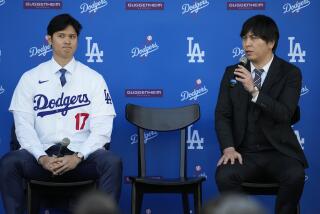Japanese Leader Seeks New Basis for U.S. Ties : Diplomacy: ‘Joint responsibility is greater’ since end of Cold War, Miyazawa says on eve of Washington visit.
- Share via
TOKYO — When Kiichi Miyazawa first visited the United States as a young man in 1939, Japan had just invaded China and was on the path to war with America.
“Japan’s leaders thought they could beat America because America was in such disarray,” Miyazawa recalled in an interview with the Los Angeles Times shortly before becoming prime minister in 1991. “It was a mistake.”
Now, 54 years later, on the eve of his trip to Washington to meet with President Clinton, he is not about to make the same mistake.
As the Cold War rationale for Japan’s security relationship with the United States begins to fade, Miyazawa is seeking to forge a new basis for a robust bilateral relationship that will help to contain future confrontations over such issues as trade.
“Our joint responsibility is greater, not smaller, since the end of the Cold War,” Miyazawa said in a meeting with a small group of U.S. journalists Monday. He noted that Japan and the United States together make up 40% of the world’s economy and have grown increasingly interdependent.
A senior Foreign Ministry official said at a luncheon briefing earlier in the day: “We have to explore new types of cooperation and redefine the role played by Japan in the international community.”
Miyazawa recognizes that to keep the relationship on an even keel, he will be called on by Clinton to slash Japan’s $49-billion trade surplus with America. Last year, Japan accounted for 40% of America’s total trade deficit with the world.
Japan will commit itself to “drastically reducing” its trade surplus with the United States, Miyazawa said. “It is an anomaly and we must correct it.”
Today, the Japanese government will unveil a package of measures worth $105 billion designed to drag Japan’s economy out of its slump and boost imports. It should be an impressive gift to Clinton, who is still struggling to get his $16-billion package passed in Congress.
“We have taken almost every conceivable measure to help take the economy out of its slump, except large-scale income tax reduction,” Miyazawa said.
However, in what may be a sign of growing assertiveness on Japan’s part, officials say they will resist the use of “managed trade” policies that promise sales to U.S. companies.
Miyazawa said, for example, that the stimulative package will not include substantial sums for direct government purchases of American products, as some U.S. trade officials have requested.
American observers have expressed concern that most of the new Japanese government money would be spent on public works projects for which American firms cannot fairly compete. Recent disclosures have revealed that Japanese construction companies pay politicians huge sums to win public works contracts.
Miyazawa also argued that a 1991 semiconductor agreement, under which Japan successfully doubled the foreign share of its chip market to the 20% target, was not a model for future agreements.
“We are an open market,” he said. “I won’t promise anything I can’t deliver on.”
A Foreign Ministry official said the setting of nominal targets for U.S. imports is unwise because it shows “a lack of confidence in Japan. It is as if from the outset you are saying, ‘I don’t trust you.’ ”
While Japan pushes for a more equal partnership with America, Miyazawa admitted that cultural traits make it difficult for his country to act without foreign pressure, or gaiatsu .
“It is like a (Japanese) mother telling her child to do this or not to do it, otherwise your neighbor will laugh at you,” Miyazawa said. “That is the way of education in this country.”
Japan’s recent decision to boost its aid package to Russia is an example of this unhealthy pattern of the American parent embarrassing Japan into acting by threatening to make it an international outcast, analysts said.
While much of the upcoming meeting in Washington will focus on economic issues, analysts say that what Miyazawa really wants most from Clinton is a promise that he will consult Japan on major decisions as a part of a political reaffirmation of the importance of the bilateral alliance.
Miyazawa is playing down his political agenda because he remembers too clearly how his efforts to promote a “Tokyo Declaration” reaffirming such a relationship during former President George Bush’s visit to Tokyo last year ended in disaster when Bush chose to focus instead on issues such as automobile trade.
“Japan was very disappointed when Bush focused just on economic ties,” said Terumasa Nakanishi, a professor of international politics at the University of Shizuoka.
Nevertheless, Japan is expected to propose a new framework for high-level consultations to resolve future conflicts before they get serious.
In hopes of focusing more attention on the positive aspects of the bilateral relationship, Foreign Ministry officials say they have taken the initiative to come up with proposals where Japan can work jointly with America to solve world problems.
Japan will offer, for example, to finance a joint effort with the United States to deal with pollution in Eastern Europe. There is also talk of joint development of transportation projects and a Japanese plan to help America with vocational training.
More to Read
Sign up for Essential California
The most important California stories and recommendations in your inbox every morning.
You may occasionally receive promotional content from the Los Angeles Times.













